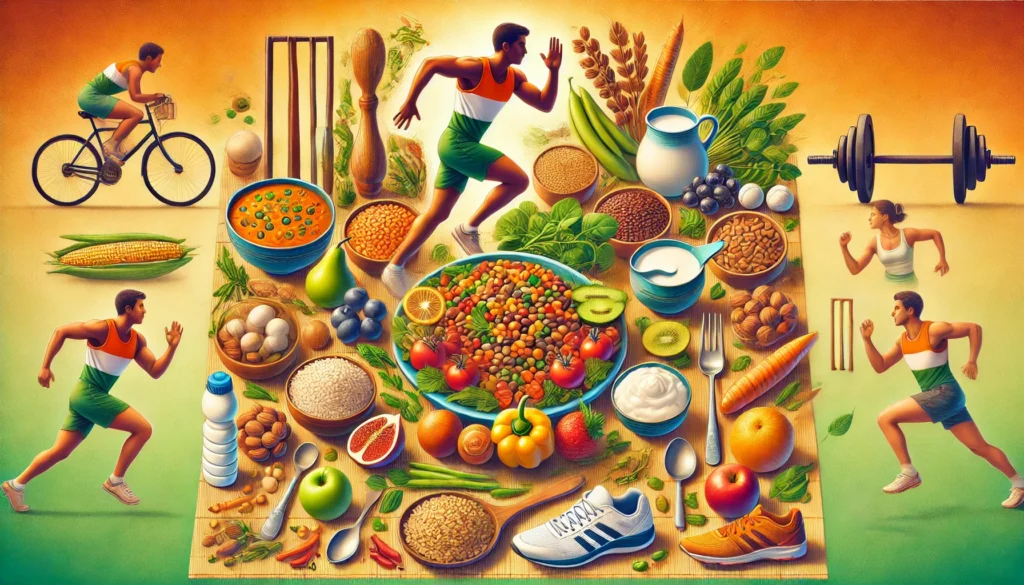
Diet plays a critical role in shaping the athletic performance of individuals, offering the energy and nutrients needed to maintain physical fitness, build muscle, and recover from strenuous activities. For athletes, the right balance of macronutrients and micronutrients is essential for achieving peak performance. Traditional Indian foods, with their rich heritage and diverse ingredients, offer a wealth of nutritional benefits that can support athletes in their training regimes. From ancient grains like ragi to the use of spices such as turmeric for their anti-inflammatory properties, Indian cuisine has much to offer in terms of natural, wholesome food options. Embracing a diet that incorporates these traditional foods can provide athletes with a natural edge, enhancing their endurance, strength, and recovery processes. By combining time-tested Indian food practices with modern sports nutrition principles, athletes can create a balanced diet that supports their goals and keeps them energized throughout their training journey.
Understanding the Nutritional Needs of Athletes
Athletes have unique nutritional needs that go beyond those of the average person, requiring a precise balance of macronutrients, micronutrients, and hydration to support their intense physical activities. Meeting these needs is essential for optimal performance, injury prevention, and effective recovery.
Importance of Macronutrients: Carbohydrates, Proteins, and Fats
Carbohydrates are a primary source of energy for athletes, providing the fuel needed for both short bursts of high-intensity activity and longer endurance events. Foods rich in complex carbohydrates, such as rice, whole grains, and sweet potatoes, are essential for maintaining glycogen levels in muscles, which directly impact performance. Proteins, on the other hand, are vital for muscle repair and growth. For Indian athletes, traditional protein sources like lentils, chickpeas, and paneer provide the building blocks needed for muscle recovery and strength development. Healthy fats, such as those found in nuts, seeds, and ghee, play a crucial role in hormone regulation and maintaining joint health, which is critical for athletes who engage in high-impact sports.
Role of Micronutrients: Vitamins and Minerals
While macronutrients provide energy, micronutrients such as vitamins and minerals are crucial for overall health and athletic performance. Iron, for example, is important for oxygen transport in the blood and is especially important for endurance athletes. Leafy green vegetables like spinach, as well as lentils, are excellent sources of iron in Indian cuisine. Calcium and vitamin D are critical for bone health, reducing the risk of stress fractures, and can be found in dairy products like milk and curd. The inclusion of fruits like oranges and lemons, rich in vitamin C, helps boost immunity and supports collagen production, aiding in tissue repair.
Hydration and Electrolyte Balance
Staying hydrated is essential for athletes, as even a slight loss of body water can lead to decreased performance and increased risk of injury. In the Indian context, traditional drinks like coconut water offer a natural source of electrolytes, including potassium, which helps maintain hydration levels during intense physical activity. Salted buttermilk is another age-old remedy that helps replenish sodium lost through sweat, providing a refreshing and effective way to maintain electrolyte balance. Proper hydration, combined with a balanced diet, ensures that athletes can perform at their best and recover more efficiently after workouts.
By understanding these key components of nutrition, athletes can tailor their diet to meet their specific needs, leveraging the natural benefits of traditional Indian foods to enhance their performance.
Top 5 Traditional Indian Foods for Boosting Athletic Performance
Indian cuisine offers a rich variety of traditional foods that can provide athletes with the nutrients they need to perform at their best. These foods are not only packed with essential vitamins and minerals but also have a history of being used to promote strength, endurance, and recovery.
- Chana (Chickpeas)
Chickpeas are a powerhouse of protein and complex carbohydrates, making them an excellent source of sustained energy. They are also rich in fiber, which aids digestion and helps maintain a steady blood sugar level, preventing energy crashes during training. - Paneer (Cottage Cheese)
Paneer is a high-protein dairy product that is easy to digest and helps in muscle recovery and growth. It contains all essential amino acids and is a great option for vegetarian athletes looking to increase their protein intake. - Ragi (Finger Millet)
Ragi is rich in calcium, iron, and dietary fiber, making it a superfood for athletes. It helps in maintaining strong bones, supporting endurance activities, and improving overall stamina. Ragi porridge or roti can be an excellent addition to an athlete’s diet. - Almonds and Dates
Almonds provide healthy fats, protein, and antioxidants, which are beneficial for muscle repair and overall recovery. Dates, rich in natural sugars and potassium, offer a quick energy boost, making them ideal as a pre-workout snack. - Ghee (Clarified Butter)
Ghee is a source of healthy fats and is known for its anti-inflammatory properties. It aids in digestion and helps lubricate joints, making it particularly beneficial for athletes who engage in high-intensity physical activities.
These traditional foods are not only nutritionally dense but are also easily available, making them a practical choice for athletes looking to optimize their diet for better performance.
How Traditional Indian Foods Support Endurance and Recovery
Traditional Indian foods have long been celebrated for their ability to support physical health, and they play a significant role in boosting endurance and aiding recovery for athletes. This is particularly true due to the rich blend of spices, herbs, and natural ingredients that contribute to overall well-being.
Turmeric and Ginger for Anti-Inflammatory Benefits
Turmeric, with its active compound curcumin, is well-known for its powerful anti-inflammatory properties. It helps reduce muscle soreness and joint inflammation, making it an ideal addition to an athlete’s recovery diet. A glass of warm turmeric milk, often referred to as “haldi doodh,” can be a soothing remedy for post-workout recovery. Ginger, similarly, helps reduce muscle pain and improves circulation, supporting faster recovery after intense training sessions.
Importance of Lentils and Pulses for Muscle Recovery
Lentils and pulses such as moong dal and masoor dal are rich in proteins and essential amino acids, which are crucial for muscle repair and recovery. These plant-based proteins are easy to digest and help replenish the muscle fibers that break down during strenuous activities. Additionally, the high iron content in these pulses aids in maintaining proper oxygen levels in the blood, supporting overall stamina and endurance during long training sessions.
Role of Ayurvedic Herbs in Reducing Fatigue
Ayurvedic herbs such as ashwagandha and amla are known for their rejuvenating properties, helping to combat physical fatigue and stress. Ashwagandha, in particular, is widely used to enhance endurance and strength. It helps in improving muscle mass and reducing stress hormones, which can be beneficial for athletes aiming for peak performance. Amla, rich in vitamin C, boosts immunity and supports cellular repair, making it an effective addition to an athlete’s diet for maintaining overall health and resilience.
By incorporating these traditional Indian foods into their daily routines, athletes can benefit from their natural healing properties, supporting both their endurance and recovery. This holistic approach to nutrition ensures that athletes can maintain their performance levels over longer periods, reducing the risk of burnout and injury.
Common Dietary Mistakes Athletes Should Avoid
While maintaining a proper diet is crucial for athletic success, certain common dietary mistakes can undermine performance and recovery. Recognizing and avoiding these pitfalls can make a significant difference in achieving training goals.
- Skipping Meals and Under-Eating
One of the most common mistakes is skipping meals, especially breakfast. Athletes need a steady intake of energy to fuel their workouts and maintain focus. Skipping meals can lead to low energy levels, poor concentration, and even muscle loss over time. - Overconsumption of Processed Foods
Processed foods, often high in sugars and unhealthy fats, can provide empty calories without the necessary nutrients. Consuming too many processed snacks and energy drinks can lead to weight gain and decrease the efficiency of recovery. - Ignoring the Importance of Hydration
Staying hydrated is critical for maintaining peak performance, but many athletes overlook the importance of drinking enough water and replenishing electrolytes. Dehydration can lead to muscle cramps, reduced stamina, and impaired cognitive function, all of which can negatively impact training and competition results.
By being aware of these mistakes, athletes can adjust their diets to ensure they are getting the right nutrients and hydration to support their physical efforts.
Integrating Traditional Indian Foods into a Modern Athlete’s Diet
Integrating traditional Indian foods into a modern athlete’s diet offers a balanced approach that combines the wisdom of ancient practices with contemporary nutritional science. By leveraging the natural benefits of foods like lentils, ghee, and spices, athletes can create a diet that is not only nutritious but also deeply rooted in Indian culture.
For example, adding a bowl of ragi porridge or dal to the diet can provide the necessary proteins and complex carbohydrates for sustained energy. Including turmeric and ginger in meals or recovery drinks can help manage inflammation and speed up recovery times. Pairing these traditional elements with modern supplements or protein shakes can offer a comprehensive diet plan that meets all nutritional needs.
Moreover, Indian athletes can benefit from the diverse flavors and variety of traditional foods, making it easier to stick to a nutritious diet without feeling restricted. This blend of old and new ensures that athletes can maintain a diet that supports their goals while enjoying the rich culinary heritage of India. By adopting this approach, athletes can stay at the top of their game, both physically and mentally, while celebrating the richness of their cultural roots.






